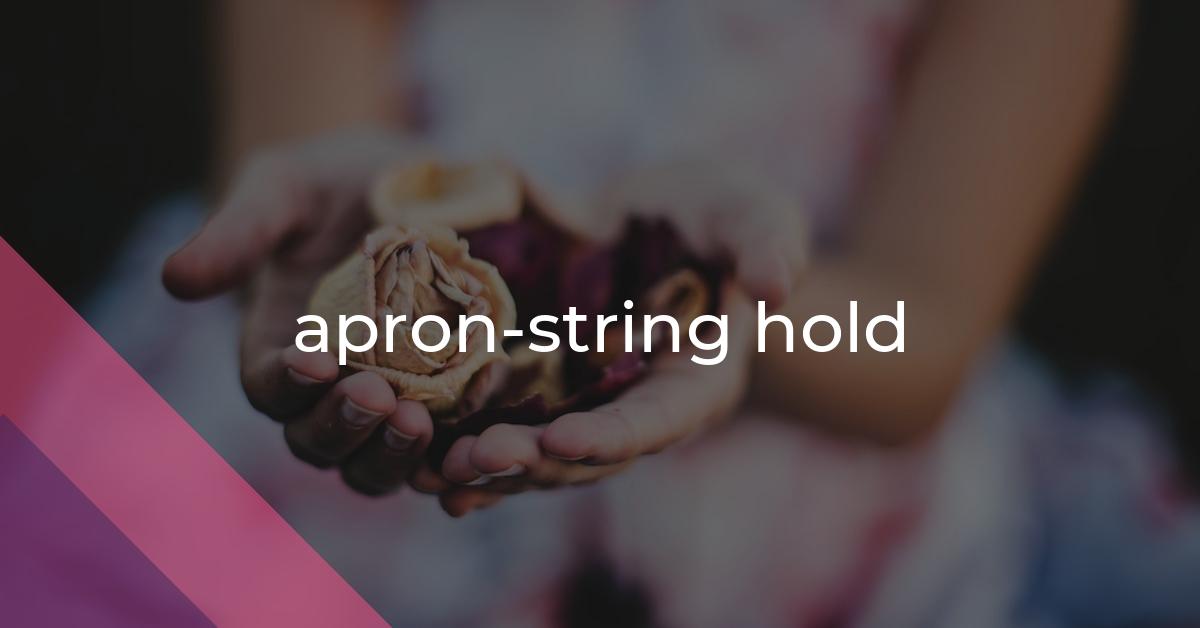apron-string hold: Idiom Meaning and Origin
What does ‘apron-string hold’ mean?
An "apron-string hold" refers to a close, controlling relationship between a person, usually a child, and their parent or guardian, where the person is overly dependent and unable to function independently.

Idiom Explorer
When someone "loosens the apron strings," it means they are allowing someone who is dependent on them to become more independent and self-reliant.
A "latch-key child" refers to a child who returns home from school alone because their parents are working, and they have a key to let themselves into the house. This term emphasizes the child's independence and responsibility at a young age.
The idiom "keep a close watch" means to closely monitor or observe something or someone, usually with the goal of ensuring their safety, security, or well-being.
The idiom "in someone's pocket" means to be under someone's control or influence.
The idiom "in one's pocket" means having control or influence over someone or something.
The idiom "hold the ring" means to be in control or to take charge of a situation or event.
The idiom "hold the reins" means to have control or be in charge of a situation or group of people.
The idiom "hold the purse strings" means having control or authority over financial matters or spending decisions.
The Grip of Dependency
The idiom "apron-string hold" is rooted in the physical apron strings that mothers traditionally wore when cooking or caring for their children. It metaphorically represents a strong bond or attachment between a person and their mother. This idiom is commonly used in American English to describe someone who is overly dependent on their mother or excessively attached to her.
The phrase "apron-string hold" signifies a person's inability to function independently or make decisions without their mother's guidance or involvement. It suggests a level of emotional and psychological dependence on the mother, to the extent that the person is unable to establish their own identity or make decisions without her input.
The idiom implies that the person is unable to "cut the apron strings" and establish independence from their mother. In other words, they are not able to break free from the metaphorical ties represented by the apron strings.
When a person has an apron-string hold, it often means they consistently seek their mother's advice or permission for even minor decisions. They rely heavily on her and are unwilling or unable to take responsibility for their own lives.
It is important to note that the idiom "apron-string hold" is often used in a critical or derogatory manner, highlighting a lack of maturity or independence. It may suggest that the person in question is limiting their potential and personal growth by relying too heavily on their mother's guidance and approval.
However, it is essential to approach the usage of this idiom with sensitivity and understanding. There may be underlying reasons behind an individual's apron-string hold, including cultural or familial influences, as well as personal insecurities or challenges.
Despite its critical connotations, the idiom "apron-string hold" provides a clear and concise way to describe the specific type of relationship dynamic between a person and their mother. It epitomizes a strong attachment and dependence that hinder personal growth and independence.
By exploring the origins and nuances of this idiom, we can gain insights into the complex dynamics of interdependence and familial relationships. It raises questions about the role of parents, particularly mothers, in shaping their children's independence, and how these dynamics can impact personal growth and self-identity.
The idiom "apron-string hold" also offers a unique lens to examine the intricate connections between individuals and their mothers. It helps us understand the societal expectations and cultural norms that contribute to the apron-string hold phenomenon.
Example usage
Examples of how the idiom "apron-string hold" can be used in a sentence:
- He is still living with his parents and has never really escaped their apron-string hold.
- She needs to learn to be more independent and break free from her mother's apron-string hold.
- The company's founders have maintained an apron-string hold on the business, making it difficult for new ideas to be implemented.
The idiom "apron-string hold" is typically used in situations where someone is unable or unwilling to break free from the control or influence of another person or entity. It often implies a sense of dependency or lack of independence.
More "Dependency" idioms



